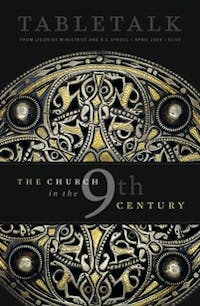
Request your free, three-month trial to Tabletalk magazine. You’ll receive the print issue monthly and gain immediate digital access to decades of archives. This trial is risk-free. No credit card required.
Try Tabletalk NowAlready receive Tabletalk magazine every month?
Verify your email address to gain unlimited access.
Pray with your mouth, cry out with your heart, make petitions while you work, so that every day and night, every hour and moment, God may always assist you.” These are the words of the ninth-century, Christian noblewoman, Dhouda. She penned these words of admonition to her son William. She was concerned that her oldest son, a page in the court of Charles the Bald, would understand what it means to be a godly man. Dhouda’s Handbook for William contained wise counsel to her son concerning the necessity of daily prayer, his conduct in public worship, and the importance of his reverence in prayer, in worship, and in all of life.
This is but one example of the sort of writing that emerged from the ninth century. Early in the ninth century, a local pastor produced a catechism for laypeople so that they might understand the doctrinal formulations of Scripture. Near the middle of the century, Jonas, bishop of Orleans, wrote The Lay Way of Life, a catechism for laypeople concerning a vast array of matters pertaining to the Christian’s life and morals. In the latter part of the ninth century, Alfred the Great of England took part in the translation of Gregory’s classic work On Pastoral Care, and Alfred made certain that every pastor received a copy so that he might become better equipped to shepherd the flock of Christ.
Although many of these writings are replete with doctrinal errors, they reveal this one, undeniable truth — in the ninth century the Lord God Almighty was building His church, and the medieval gates of the Dark Ages could not prevail against it. Sure, there were divisive, ecclesiastical disputes in the ninth century, there was corruption among the leadership of the church, and doctrinal errors abounded — not much has changed. But thanks be to God that He Himself has not changed, nor can He. Our God has been our help in ages past, and He is our hope for years to come. He is faithful to His promise, and being the Sovereign God of promises He will continue to raise up, call forth, and send out His generation of faithful men and women in every generation in preparation for His return, when we will “cry out with our hearts” and our voices before His face, coram Deo, with that host of His elect from every century, every nation, and every tongue.
